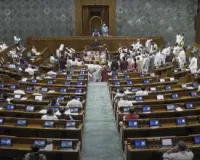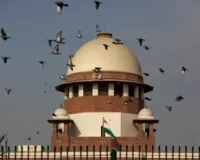ECI defends transparent electoral roll process, highlights role of political parties and timely objections

In response to recent criticisms from political parties regarding alleged inaccuracies in electoral rolls, the Election Commission of India (ECI) released a comprehensive 10-point clarification on Saturday, reaffirming the transparency and integrity of the electoral roll preparation process.
The ECI emphasised that electoral rolls are compiled through a multi-stage, decentralised process with political party involvement at every step. The commission strongly criticised the practice of raising issues post-election, noting that any genuine concerns could have been addressed during the designated "Claims and Objections" period.
Here are the 10 key points outlined by the ECI:
1. Decentralised, law-governed system
India's electoral system for Parliamentary and Assembly elections is a decentralised structure, governed by legal provisions and executed at multiple administrative levels.
2. EROs and BLOs Responsible for Accuracy
Electoral Registration Officers (EROs), typically Sub-Divisional Magistrates (SDMs), prepare and finalise electoral rolls with the support of Booth Level Officers (BLOs). Both are responsible for ensuring the accuracy of voter data.
3. Public Access to Draft Rolls
After the draft rolls are prepared, they are published in both digital and physical formats. These are shared with all political parties and made available on the Election Commission’s website to ensure maximum transparency.
4. One-Month Window for Corrections
Once the draft is published, a one-month period is provided for electors and political parties to submit claims and objections regarding errors or omissions. This is the official window for correction before final rolls are issued.
5. Post-Publication Appeals Mechanism
After final rolls are released, a two-tier appeal process exists. The first appeal can be made to the District Magistrate (DM), and the second to the Chief Electoral Officer (CEO) of the respective State or Union Territory.
6. Transparency is Key
The Commission reiterated that transparency is the foundation of the electoral roll preparation process, and all procedures are conducted according to law and established rules.
7. Political Parties Failed to Act Timely
The ECI stated that some political parties and their Booth Level Agents (BLAs) failed to examine the draft rolls during the appropriate period and therefore missed the opportunity to flag errors.
8. Complaints Raised After the Fact
Some parties and individuals are now raising issues with electoral rolls from previous elections, despite having had ample opportunity to contest them during the designated correction phase.
9. Claims Must Be Timely and Through Proper Channels
The Commission stressed that the appropriate time to raise electoral roll concerns is during the Claims and Objections period. Timely action through the correct channels would have allowed EROs to address and rectify valid issues before elections.
10. ECI Welcomes Constructive Scrutiny
Finally, the Commission reiterated its openness to continuous scrutiny of electoral rolls. Input from parties and citizens is always welcome, as it contributes to cleansing and refining the electoral database.
ECI's message to stakeholders
“Utmost transparency is the hallmark of electoral roll preparation. If political parties or individuals had pointed out errors during the designated period, the responsible officers could have corrected them. Raising such issues after the elections undermines the integrity of the process,” the ECI said in a press release signed by Deputy Director P. Pawan.
The Election Commission has reaffirmed its commitment to upholding the sanctity of the electoral process and has encouraged political parties to be proactive and responsible participants during every stage of election preparation.
About The Author
Welcome to Aryan Age, an English newspaper that has been serving readers since 2011 from Delhi. With a loyal circulation of over 19,000, we are dedicated to providing our readers with the latest news and information, as well as insightful analysis and commentary that help them navigate the complex and rapidly changing world.











Comment List